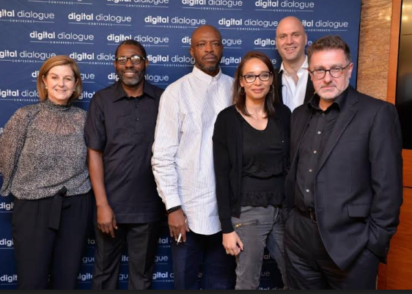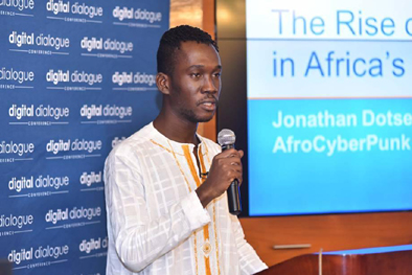
By Jide Ajani
Participants at the 5th Digital Dialogue Conference, facilitated by MultiChoice Africa, examined the future of pay-television in a rapidly changing world and made wide-ranging suggestions on the best mode of engagement.

For three days, between May 2 and 5, the luscious city-state of Dubai, United Arab Emirates, UAE, hosted the 5th Digital Dialogue Conference. The conference, facilitated by MultiChoice Africa, is a thought leadership platform created in 2012 to foster a better understanding of the future direction of Africa’s pay-television industry.
In attendance were a delegation of international industry thought leaders and key media stakeholders from across Africa.
The conference opened with a presentation by Yolisa Phale, Video Entertainment CEO, MultiChoice. In her presentation, “Using Digital Technology To Amplify African Stories”, she submitted that rapid advancement in digital technology in Africa has led to new forms of innovation in content delivery. While admitting that this will change how people consume television content, Phale noted that it is the collective responsibility of pay-television service providers in Africa to ensure that the continent benefits from the change.
Phale pointed out that MultiChoice has maintained a culture of innovation because it foresaw the change.
“If you speak to any of the people involved in the early days of MultiChoice, one of the things they remind me of is the absolute necessity to not just understand what the future holds but to shape the future, to be a disrupter and if necessary even to cannibalise yourself. ‘Why launch GOtv when you already have DStv?’ for example, but MultiChoice Africa was launched by people who were creating a media company not for the present, but one for the future,” she said.
To remain relevant in the rapidly changing world, Phale said since content is king, it is crucial to focus more on local stories and deliver them in languages that people understand. She equally stressed the need to evolve with technology and adapt it for content production as well as the importance of maintaining customers despite the competition provided by online streaming. MultiChoice, she added, produces over 16 local content channels across the continent showcasing local storytellers and created the Africa Magic Viewers’ Choice Awards, AMVCA, that celebrate African filmmaking. As a company, she explained that MultiChoice works with broadcasters so that East Africans can see what is happening in West and Southern Africa.
The impact of digital technology on Nollywood, Africa’s premier film industry, was part of the discussions at the conference. Femi Odugbemi, Nigerian filmmaker, television producer and photographer, presented a paper titled “The Nollywood Revolution”.
According to Odugbemi, digital solutions created possibilities in Nollywood’s sub-sectors including distribution, production, manpower and governance.

“Filmmaking in Nigeria is gradually becoming more sophisticated because of the growing options that digital filmmaking avail filmmakers, such as applications that can create a virtual rendition of a scene,” he noted.
Futurist and innovation expert, Paul Papadimitriou, in his stimulating presentation, “How Digital Has Changed Lives”, explained that pay television companies need to shift the focus from content delivery systems to understanding their consumers in terms of when they watch, what they watch and for how long they watch.
He remarked that the way consumers watch television has evolved and urged companies to understand the new consumption behaviors and mindsets of consumers.
“The new consumer is nomadic (they can be everywhere and anywhere); tribal (gathering around similarities) and singular (entrepreneurial, be who they want to be),” he said.
Papadimitriou added that the opportunities in emerging countries are many and called on television companies to capitalize on the window to innovate.
“The best innovators are like the best travelers – they’re not afraid of unknown territories. They understand who people are and the journeys they’re on. They just do it. Let’s jump,” he advised.
Jonathan Dotse, a Ghanaian Afrofuturist and Science Fiction Writer, called on the continent’s creative minds to fuse African culture with modern concepts of development to reconstruct the missing pieces of Africa’s lost history in technology to drive youth engagement and futurist thinking.
He observed that on the back of the success of Black Panther, Afrofuturism is experiencing a resurgence with the thirst for new perspectives on African stories in relation to technology. “Back in 2009, I attempted to write science-fiction. However, I was trying to write it from an African perspective but found it difficult to find a believable foundation to build my content. My ideas were based on a Western perspective, so I began to think more about Africa and science-fiction in a constructive and realistic way while creating awareness for the lack of Afrocentric narratives in the genre,” he recalled.
Dotse stated that the African-American diaspora has greatly helped the resurgence of Afrofuturism.
“Expressions of Afrofuturism are present in all facets of African and African-Diaspora creativity. The African Diaspora has played a significant role in advancing defining Afrofuturism while various independence movements spurred much of the creative energy,” he argued.
Anthony Lilley (OBE), a professor of Creative Industries at Ulster University in Northern Ireland, argued that technology is both disruptive and revolutionary. In his presentation, “The Potential of Technology In The Attention Economy”, Lilley declared that capturing and retaining the attention are key to sustainability in the digital world.
“Digital is more about how we human beings and society connect with each other. But how do you grab attention, create meaning and tell stories? How do we engage with people’s passions and what does it all mean for our culture? The answers to these questions can be answered by three major factors affecting content businesses of today: video on-demand, personal/mobile and that we are inundated with data and intelligence which can do new things,” said Lilley.
He contended that television companies have so much time to capture people’s attention and those who can capture it, can sell it to someone else.
“You can’t force them to give you their attention anymore when there’s content everywhere and businesses that understand the value of attention and can capture it, can sell it to someone else. That has always been the way TV companies sell advertisement space – because there’s a captive audience that is paying attention,” he reasoned.

In an interview with John Ugbe, MD, MultiChoice Nigeria, he explained the giant strides of his company in the areas of digital broadcasting and content provision.
According to him, “we are in pay TV; we are in entertainment. Entertainment is a mix of fun, inspiration and education. Furthermore, we have a lot of educational and kids content. We ask our viewers to set up parental guidance so you can control what your child views. Kids these days have smartphones and can download anything, but the blame is often put on TV. You can opt out of a channel or block it completely at any time. We put the power into your hands. About Big Brother, we can learn from their interaction in the house. They have tasks that promote nationalism, patriotism. You see those contestants singing the National Anthem proudly. When they talk about malaria day – we use it as an opportunity to educate. A lot of the tasks are subtle but meant to inspire and lead”.
In the area of revenue generated from the Big Brother show, which became controversial in Nigeria, Ugbe said “the actual revenue generated from SMS voting could not be further from the much-touted purported figure. Over and above, the administration and platform set up costs, the majority of the profit went directly to the GSM and data service providers”.
On the whole, the conference appeared to have succeeded in engendering another form of awareness that is at once compelling and enervating.
For each presentation, participants interrogated the focal essence of the relevance of some theoretical assumptions.
For instance, the Afro-futurism thesis stumbled, when the issue of spirituality and the African mentality were discussed. Whereas some participants attempted to draw a parallel between the established belief system that creates an acceptance for live coverage, the internet or even modern day telephony on the one hand, and the African spirituality sometimes steeped in witchcraft, voodoo and the likes, the counter argument draw the attention of delegates to the existential challenge of the belief system in Africa in the realm of the self same spiritual matters.
On the whole, the relevance of the conference would be located in the improved body of knowledge it created within the three days, as well as innovations that are expected in the coming months across the African continent in the broadcasting industry.
The post Digital World and Future of Pay Television appeared first on Vanguard News.

